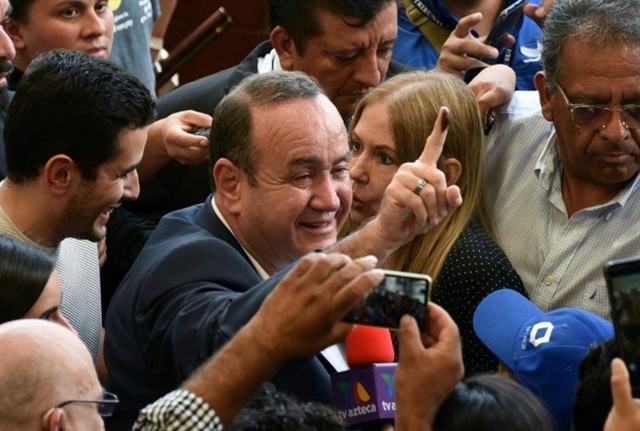 World
World


|
| Conservative Alejandro Giammattei declared victory in Guatemala's run-off presidential election. — AFP Photo |
GUATEMALA — Conservative candidate Alejandro Giammattei declared victory in Sunday's run-off presidential election in Guatemala, holding a major lead with the results from more than 90 per cent of polling stations counted.
Giammattei had almost 60 percent of the vote to former first lady and social democrat Sandra Torres's 40 per cent in their bid to succeed corruption-tainted Jimmy Morales.
"The aim is fulfilled," said Giammattei.
The central American country's next president will be under immense pressure from the United States to implement a controversial migration pact that would allow Washington to send most Honduran and Salvadoran asylum seekers who passed through Guatemala back to the poor, crime-stricken country.
The two candidates had both avoided committing to strong positions on the US deal.
Corruption was the main issue leading up to the first round of elections in June – which Torres topped – but that has been superseded by the political scandal over the migration deal.
'Lose-lose scenario'
The center-left Torres, whose ex-husband Alvaro Colom was president from 2008-2012, has been suspected of involvement in corruption.
Giammattei, a doctor by profession, scored well on voter concerns such as the economy, corruption and security, according to Risa Grais-Targow of the Eurasia Group.
Should he win, though, he "would face a lose-lose scenario" regarding the migration pact, Risa Grais-Targow of the Eurasia Group, said.
One of Morales's last acts as president was to authorise an agreement with the US administration of Donald Trump designating Guatemala as a "safe third country," which would permit Washington to turn away asylum seekers who didn't seek refuge when passing through Guatemala.
The pact – part of Trump's campaign to stem the flow of migrants to the southern US border – has proved highly unpopular in Guatemala, with demonstrators blocking roads and occupying the University of San Carlos in protest.
In a poll by Prodatos for the Prensa Libre newspaper, 82 percent of respondents opposed it.
'Risk of retaliation'
But rejecting the migration pact would run the "risk of retaliation from Trump," Grais-Targow said, after the US leader threatened a travel ban, tariffs and remittance fees if the country didn't bend to his will.
Remittances from Guatemalans in the US are a crucial part of the economy, reaching a record $9.3 billion last year. That compares to Guatemala's export revenue of $10.5 billion.
According to the World Bank, remittances account for 12 per cent of the country's GDP.
The agreement was reached last month despite Guatemala's constitutional court having earlier granted an injunction blocking Morales from signing the deal.
Almost 60 per cent of Guatemala's 17.7 million citizens live in poverty, and the country has one of the highest murder rates in the world.
Around half the killings are blamed on drug trafficking and extortion operations carried out by powerful gangs.
Morales, barred by Guatemalan law from seeking a second term, turned up to vote wearing his favourite football team's jersey.
He urged his replacement to reduce undocumented migration, improve education and tackle chronic malnutrition in the under-fives, which affects 46 per cent of infants.
Guatemalans aren't subject to Trump's proposed migrant measures, but given that poverty in some indigenous areas reaches 80 per cent, many embark on the journey in search of the "American dream" despite the dangers.
Since December, at least five Guatemalan children have died in US custody after crossing into the country from Mexico.
And in June, a woman and three children died from heat and dehydration in Texas.
"The problem is that as there's no work in Guatemala, many people want to migrate and it's sad what's happening to our Guatemalan brothers who die or are killed," Emilio Canel, a 26-year-old farmer in Sumpango, told AFP.
More than 250,000 Guatemalans were detained between October 2018 and July this year for trying to enter the US illegally, Washington's embassy said. — AFP




